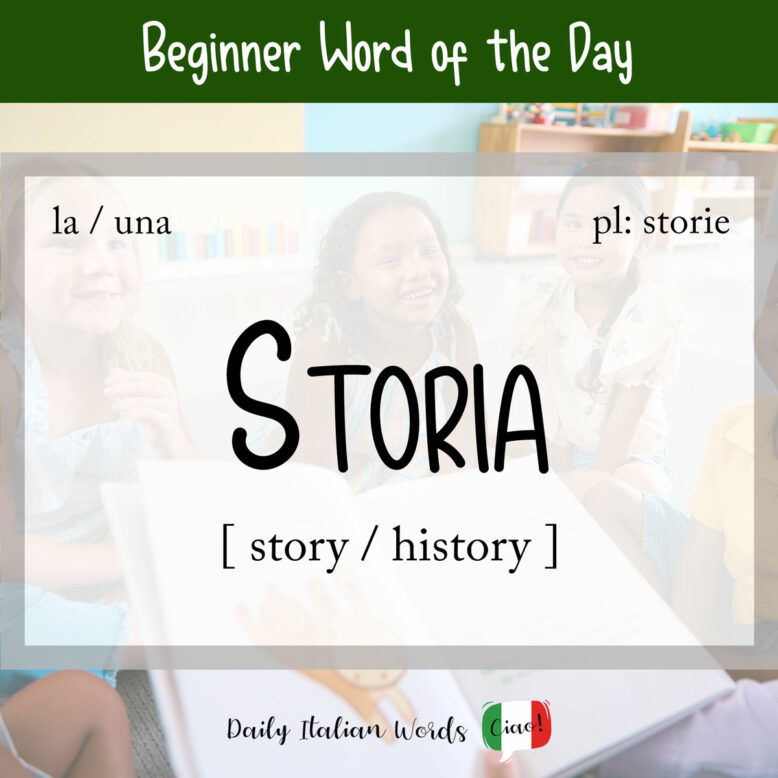Storia is a multifaceted word in Italian that means so much more than its English cognate, story. Let’s find out more about it now!

Storia is a feminine noun, so it takes the following definite and indefinite articles:
- la storia = the story / history
- le storie = the stories / histories
- una storia = a story / history
- delle storie = (some) stories / histories
Arguably the most common translation for storia is history, not story as one might expect. Storia can refer to a series of chronological past events or the subject studied in school. A common expression you should learn is passare alla storia which means to go down in history.
Mi interessa molto la storia del cinema.
I’m very interested in the history of cinema.
Here are some different kinds of storia that people study:
- la storia moderna = modern history
- la storia dell’arte = art history
- la storia naturale = natural history
- la storia antica = ancient history
- la storia mondiale = world history
That said, storia can also mean story in all senses of the English word. It can refer to a tale / fable in a book, or an account / narrative of an event or one’s experiences.
Ti ho già letto questa storia mille volte!
I’ve already read you this story a thousand times!
Cosa vuoi che ti dica… è la storia della mia vita.
What do you want me to say… it’s the story of my life.

When you tell a lie, you are essentially narrating a false tale or account. For this reason, storia can also mean lie, falsehood or fib. A more direct synonym would be bugia (lie).
Mio figlio mi ha raccontato un sacco di storie.
My son told me a bunch of lies.
In a broader sense, storia can also refer to a matter, issue or a difficult situation. For example, if you say Basta con questa storia!, it means Enough of this business!
Storia is also the word used to describe a romantic relationship between two people. For example, avere una storia con qualcuno means to be in a relationship with someone. By extension, it can also mean affair, as in an illicit relationship.

Yet another meaning is excuse or pretence. In this case, you could replace storia with the word scusa (excuse).
Si è inventato tutta sta storia per non andare a scuola.
He made up an excuse to not go to school.
Finally, storia can be translated as fuss or hassle, especially when used in its plural form storie. It’s often used to describe the behaviour of difficult people, such as capricious children or annoying customers.
Mia figlia non ha fatto storie in macchina.
My daughter didn’t make a fuss in the car.
Italian expressions containing “storia”
Below are a few common Italian expressions that contain the word storia. We hope you find them useful!
Che fa storia a sé
Literal translation: What makes its own story / That is a story on its own
English meaning: A whole other story
Non c’è storia
Literal translation: There is no story
English meaning: There is no contest / match / comparison / possibility
Essere la solita / stessa storia
Literal translation: to be the usual / same story
English meaning: to be the same old story
Heather Broster is a graduate with honours in linguistics from the University of Western Ontario. She is an aspiring polyglot, proficient in English and Italian, as well as Japanese, Welsh, and French to varying degrees of fluency. Originally from Toronto, Heather has resided in various countries, notably Italy for a period of six years. Her primary focus lies in the fields of language acquisition, education, and bilingual instruction.


